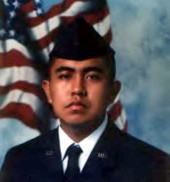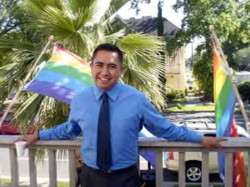 |
Ty Redhouse
A Tradition of Service
By
Denny Meyer
|
Tyson A. Redhouse grew up in a
remote corner of the Navajo Reservation in northwestern New Mexico
with a rich culture and a patriotic tradition of military service.
As a teenager, he learned about the WWII American Navajo Code
Talkers in school and was able to go and meet them himself if he
wished. Yet, one of the inspirations to serve in his country's
armed forces came from his father, who had served as a Marine in
Vietnam. In high school, Tyson had been a shy intellectual;
but he was motivated to join Marine Corps Jr. ROTC where he excelled
and became a Cadet Gunnery Sgt. and Platoon Leader. During
those two years, he said, he gained the confidence, self-assurance,
and esprit to join the Air Force, where he advanced to Staff
Sergeant during his eight years of service. His education and
intellectual prowess led him to become a highly valued intelligence
analyst, a critical specialty.
He was an "all source" analyst and worked with
reconnaissance aircraft on a daily basis, watching and listening to
multiple intelligence disciplines and piecing together assessments.
After September 11th, 2001, the work became yet more intricate,
vital, and challenging.
The small elite intelligence community in which he worked was
self-isolated, tending to stick with one another socially. As
an ethnic and sexual minority, he felt further isolated, he said,
particularly in having to keep a secret, about himself, from his
co-workers with whom he’d shared the world of intelligence. Most
of those he worked with tended to be close-minded with strongly
voiced opinions and a stereotyped view of gay people. He dealt
with that so successfully that he was promoted and became a
supervisor and became involved in training subordinates to evolve
into more egalitarian co-workers.
Like Blacks, Jews, Hispanics, and other minorities, the Navajo have
a long proud history of courageous service despite the overt
discrimination of earlier eras. Being gay, among those, makes
one a double minority with one part of one's identity hidden and the
other open. The stress of constant vigilance is unbearable.
One the one hand there is the endless low-level discrimination
of carefully couched remarks based on colleagues' and superiors'
ignorance and discomfort of those different from themselves.
As a Navajo, according to Tyson, he did not so much encounter
discrimination as a tiresome curiosity and fascination with his
ethnicity. The honored service history of his people was well
respected; but he'd rather have been seen simply as SSgt
Redhouse, a skilled analyst, without the Windtalker baggage. Beneath
all that was the anger and frustration of having to remain silent
while hearing uninhibited hate commentary about his hidden self.
The result was loneliness as a form of survival.
While studying in an Air Force specialty degree program, he wrote a
case-study paper about a well-respected military officer who had
been discharged due to the DADT policy. The conclusion of his
paper was that DADT does not work. In Leadership School, in
response to an assignment to do a sample briefing on any Air Force
Instruction, he chose to present the Instruction regarding the DADT
policy. When the course later required him to debate an issue,
he chose to represent the argument for repealing DADT by discussing
values, economics, discrimination, and civil rights. While
these presentations were simply supposed to be the intellectual
exercises of a brilliant intelligence analyst, it still took courage
and self confidence to dare to broach the topic in the way he did.
 |
Like many young
Americans, since at least WWII, he left home for the first
time, via the military, to find his own way in the world and
make something of himself. And, as with those who did so
before him, he first recognized that he was gay while in
uniform, well away from the confines of home. Ultimately, as I and so many other gay NCOs
did before him, he decided after nearly a decade of dedicated
service not to reenlist yet again. It had become
impossible to continue to endure suffering the sacrifice of
serving in silence, to remain stoic in the face of constant
insults inspired by the official government policy of
homophobia. Like others, he took with him years of
experience, training, and leadership and left without a word
as to why. |
But, he has now, at
long last, spoken out. On May 8th, he testified before the
California Senate Judiciary Committee prior to their passing a
resolution urging Congress and the President to enact the Military
Readiness Enhancement Act which would call for the repeal the Don't
Ask Don't Tell law and allow all Americans to choose to volunteer to
serve in our armed forces, regardless of sexual orientation, openly
with pride. As he recalls, he told the Committee:
"My name is Tyson Redhouse
and I am a gay veteran. I was honorably discharged from the United
States Air Force after eight years of service, specifically, in the
intelligence community. At the time of my separation, I was a Staff
Sergeant. I was a supervisor, a mentor and one of the best military
intelligence researchers and analysts in my unit. I ultimately
decided not to reenlist because of Don't Ask, Don't Tell. This
policy forced me to fly under the radar both on and
off-duty. Under this policy, I was not allowed to take part in
everyday conversations. I could not talk about the things I
cared about or the people I loved. As a supervisor, I heard anti-gay
comments from both the leadership and my troops and I could not
defend myself. Now, as a civilian, there's not a day that goes by
that I regret leaving behind a life that I loved, not only because
of the camaraderie and not only because I felt I was a part of
something bigger than me. Ultimately, it was because this policy
states that I am not good enough to serve my country"
Additionally, an Equality California (EQCA) press release about the
testimony and resolution, said in part:
The Senate Judiciary Committee
passed SJR6, authored by Sen. Christine Kehoe, D-San Diego, and
sponsored by Equality California, urging Congress and President
George W. Bush to adopt the Military Readiness Enhancement Act of
2007 (H.R. 1246). The federal bill would prohibit
discrimination in the military based on sexual orientation.
"The U.S. military
continues to discriminate against an entire community of service
members simply because they identify as lesbian, gay, bisexual or
transgender," said EQCA Executive Director Geoff Kors.
"This blatantly discriminatory policy not only prohibits able
and willing people from defending their country, it weakens our
national defense by discharging talented and highly capable
individuals."
"Qualified, patriotic
service members who want to serve their country are being
dismissed from the military for no other reason than their sexual
orientation," said Sen. Kehoe. "As a result, these
service members must live with the stigma of being forced out of
the military and taxpayers are left to pay millions of dollars to
replace some of our most competent and well-trained troops."
Tyson Redhouse, a gay veteran,
originally from northwestern New Mexico who now
resides in northern California, who was honorably discharged from
the Air Force in 2006, told the Committee members that the
military's policy forced him to turn the other cheek when he heard
slurs against gays and would not allow him to hold regular
conversations about his life. "I decided to leave the Air
Force - a life I loved - because of this policy," said
Redhouse, who worked in intelligence. "Don't Ask, Don't Tell
tells me that I'm not good enough to serve."
|